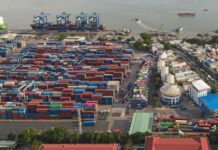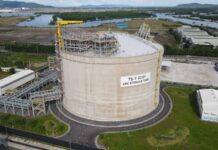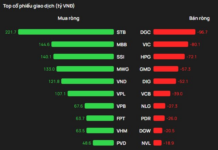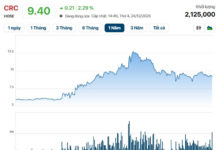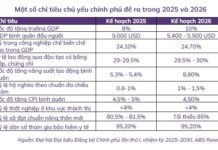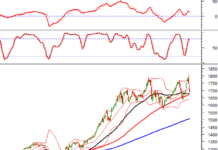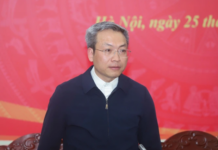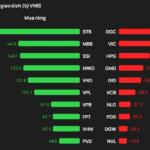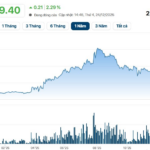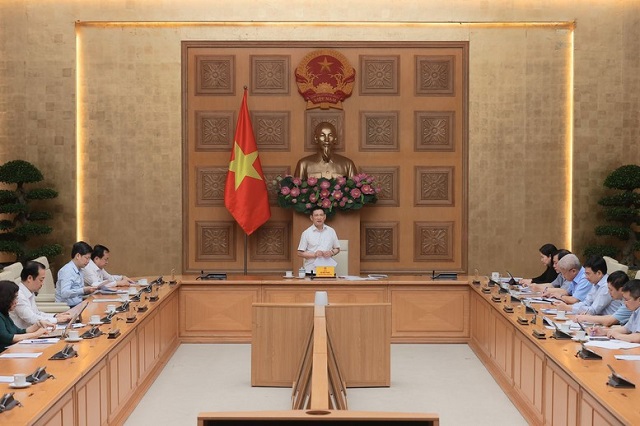
|
Deputy Prime Minister Ho Duc Phoc hosts a meeting of the Steering Committee for Price Management, evaluating the results of price management and directing efforts in the first seven months, and orienting tasks for the remaining months of 2025.
|
Vietnam’s inflation is under control, with the CPI rising appropriately to support economic growth.
On August 5, Deputy Prime Minister Ho Duc Phoc chaired a meeting of the Steering Committee for Price Management to evaluate the results of price management and direction in the first seven months and orient tasks for the remaining months of 2025.
According to the Ministry of Finance’s report on price management and direction, the market price levels have fluctuated according to the law so far this year. In the first quarter, prices rose at the beginning of the year due to the Tet holiday and then decreased in March, following the post-holiday trend.
In the second quarter, the CPI rose slightly in April and May, ranging from 0.07% to 0.16%. It then witnessed a higher increase in June (up 0.48% from the previous month) due to the rise in prices of some construction materials (bricks, sand, and stone) and gasoline, following the fluctuations in the global fuel market.
Compared to the same period last year, the CPI in the first seven months is estimated to have increased by 3.2-3.3%. This is a suitable level to support economic growth, especially as resources are focused on achieving the highest economic growth rate. Vietnam’s inflation is being controlled within the target range set by the National Assembly and the Government, ranging from 4.5% to 5%, contributing to macroeconomic stability.
The Ministry of Finance’s report also forecasts factors that may put pressure on price levels in the remaining months of 2025 (such as the prices of imported raw materials and fuel, construction materials, some essential food and beverage items, and state-managed commodities) and factors that may alleviate this pressure (including abundant domestic food supplies and the policy of free tuition for students from kindergarten to high school in public schools nationwide).
Based on these forecasts, the Ministry of Finance updated the price management scenario for the last five months of the year, expecting a CPI increase of 3.7-4.0%. International organizations predict that Vietnam’s average inflation rate will be around 2.9-4.2%. Assuming that the CPI in the remaining months increases at the same rate, there is still room for a monthly increase of about 1.19-1.58% to ensure that the average inflation rate for 2025 stays within the target range of 4.5-5.0%.
Given this scenario and assumption, the Ministry of Finance proposes price management solutions for the last few months of 2025 to ensure that the set goals are achieved.
Enhancing price management to promote rapid and sustainable growth
After the report from the Ministry of Finance, Deputy Prime Minister Ho Duc Phoc requested that the members of the Steering Committee thoroughly discuss the report and the price fluctuations of some essential commodities, which have significantly impacted people’s lives and business operations. He also called for proposing effective and suitable measures to promote rapid and sustainable development.
At the meeting, representatives from various ministries and sectors (including the Government Office, the Ministry of Industry and Trade, the Ministry of Health, the State Bank, the Ministry of Education and Training, the Ministry of Science and Technology, the Ministry of Home Affairs, the General Statistics Office, the Ministry of Agriculture and Environment, and the Ministry of Construction) expressed their agreement with the evaluation, assessment, and solutions presented in the central report from the Ministry of Finance. They affirmed that the Steering Committee for Price Management has effectively fulfilled its assigned tasks, and the price management in the first seven months of 2025 has achieved its set goals.
Based on an analysis of factors affecting domestic and global markets, including the impact of countervailing duties, representatives from these ministries and sectors provided specific comments on price management in general and the management of prices for specific goods and services in the coming time. These include gasoline, liquefied gas, electricity, healthcare services, cash supply, interest rates, credit, exchange rates, export prices of key production materials, rice, vegetables, pork, shrimp, fish, and construction materials. They also proposed solutions to ensure a balance between supply and demand and flexible and effective price management.
Concluding the meeting, Deputy Prime Minister Ho Duc Phoc highly appreciated the specific and insightful comments from the Steering Committee members. He requested that the Ministry of Finance, as the Standing Agency of the Steering Committee, incorporate these comments and complete the report for implementation in the coming time.
Deputy Prime Minister Ho Duc Phoc emphasized the critical importance of price management. He stated that if inflation is not effectively controlled, the growth results will not significantly benefit people’s lives and business operations. Enhancing price management in a reasonable way to promote rapid and sustainable growth is a mandatory requirement.
The Deputy Prime Minister requested that ministries, sectors, and localities pay close attention to the fluctuations of essential commodities closely linked to people’s lives and business operations, such as gasoline, electricity, rice, and meat. They should be prepared with appropriate management and direction solutions.
Deputy Prime Minister Ho Duc Phoc also suggested that the Ministry of Construction and the Ministry of Agriculture and Environment coordinate with provinces to implement fundamental and synchronized solutions to manage the real estate market healthily and suitably for people’s lives.
He also provided specific directions regarding managing the money supply and stabilizing the exchange rate of the Vietnamese dong against the US dollar, electricity prices, construction material prices, and prices of input materials for production.
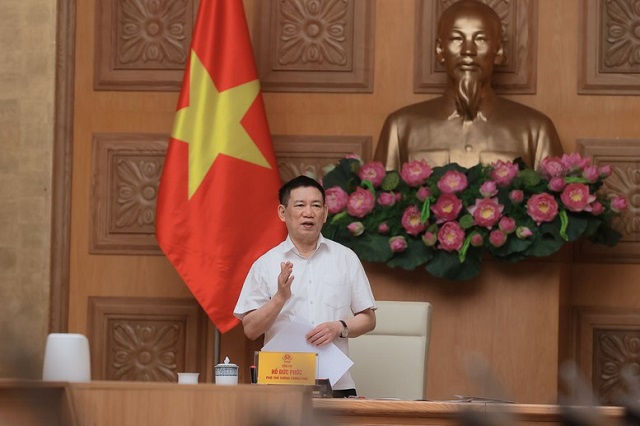
|
Deputy Prime Minister Ho Duc Phoc: Enhancing price management in a reasonable way to promote rapid and sustainable growth is a mandatory requirement.
|
Focusing on synchronously implementing solutions to strive to maintain the CPI at the most reasonable level to promote economic growth
Going forward, the Deputy Prime Minister emphasized the need to focus on synchronously implementing solutions to strive to maintain the CPI at the most reasonable level to promote economic growth. By October 2025, ministries and sectors should develop price management plans for commodities under their management for 2026 to proactively manage prices.
Additionally, it is necessary to closely monitor market price fluctuations, especially for essential consumer goods and services. Authorities should proactively and flexibly regulate supply and demand and stabilize the market to ensure production meets social needs and prevent shortages and price surges, contributing to curbing inflation and ensuring social welfare.
Ministries, sectors, and localities should closely monitor the supply and demand dynamics and market prices of commodities under their management and implement appropriate management measures. They should proactively forecast and ensure a balance between supply and demand, especially during periods of high demand for essential goods such as gasoline, construction materials, food, agricultural supplies, and transportation services. This proactive approach will prevent shortages and sudden price increases.
It is also crucial to effectively implement and supervise the implementation of price declaration and listing measures, ensure transparency in price information, and strictly handle acts of unreasonable price increases that disrupt the market.
Fiscal policy should be coordinated with monetary policy and other policies to contribute to macroeconomic stability, control inflation, and ensure the major balances of the economy.
Furthermore, it is essential to enhance communication and promote transparency in information about prices and the Government’s and Steering Committee’s price management direction, especially regarding the price fluctuations of critical materials related to production and people’s lives. This transparency will help curb inflation expectations and stabilize consumers’ and businesses’ psychology, especially during holiday periods.
– 13:15 08/05/2025
“Financial Institutions Embrace the Digital Asset Revolution”
The legalization of digital assets marks a pivotal moment in Vietnam’s legal history. As the regulatory framework evolves, investment appetite from financial institutions is already evident, with many proactively laying the groundwork and poised to enter the market when the proverbial green light shines.
“What Monetary Policy Tools Do Central Banks Typically Employ When Inflation Runs High?”
In today’s volatile global economic landscape, topics such as inflation, interest rates, and safe investment strategies are at the forefront of everyone’s minds.
“Fire Safety First: Why Dorms and Apartments Should Focus on Fire Hazard Prevention Rather Than Electric Vehicle Bans”
The reluctance of some apartment buildings and landlords to accommodate electric vehicle charging is understandable, given the lack of established risk management and fire safety measures. To address this challenge, it is imperative for residential communities to take the lead in developing a comprehensive and civilized electric vehicle management model.





